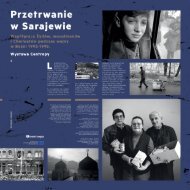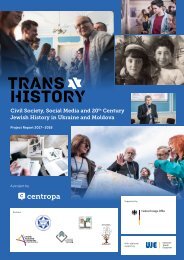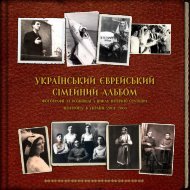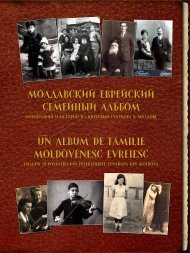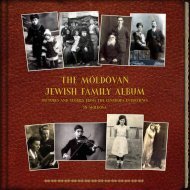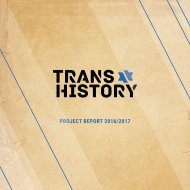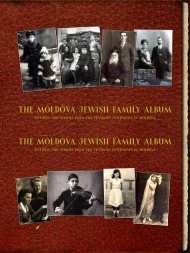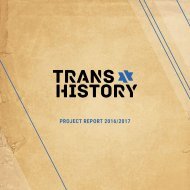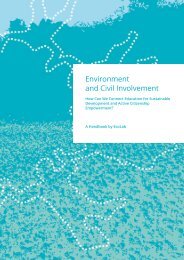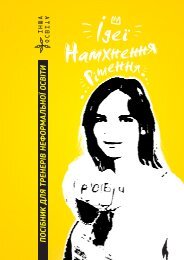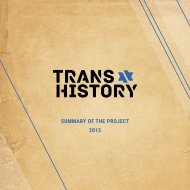Trans.History - The Moldovan Jewish Family Album - Exhibition Booklet [EN] - revised version
Create successful ePaper yourself
Turn your PDF publications into a flip-book with our unique Google optimized e-Paper software.
THE MOLDOVAN<br />
JEWISH FAMILY ALBUM<br />
PICTURES AND STORIES FROM THE C<strong>EN</strong>TROPA INTERVIEWS<br />
IN MOLDOVA
www.centropa.org IN DARK TIMES 1932–1944<br />
Preserving <strong>Jewish</strong> memory<br />
Bringing history to life<br />
<strong>The</strong> <strong>Moldovan</strong> <strong>Jewish</strong> <strong>Family</strong> <strong>Album</strong><br />
Pictures and Stories from the Centropa interviews in Moldova<br />
Published in 2017<br />
Printed by: AROXAN SERVICE SRL<br />
A project
IN DARK TIMES 1932–1944<br />
DEDICATION<br />
«<strong>The</strong>y stare back across ninety years of war and peace. This is a<br />
photograph we have seen countless times, each time different, the family<br />
group who never made it together through the Holocaust.»<br />
TOM STOPPARD
C<strong>EN</strong>TROPA IN MOLDOVA<br />
ORAL HISTORIES<br />
When Centropa was founded<br />
in Vienna and Budapest in<br />
2000 we did not plan to create a<br />
Holocaust-specific interview project.<br />
We wanted to ask the oldest living<br />
Jews in fifteen European countries to<br />
tell us stories about the entire century<br />
– as each of them lived it – and share<br />
with us their family pictures.<br />
Our team in Moldova interviewed<br />
25 Jews living in Chișinău and<br />
digitized 407 old family pictures and<br />
documents.<br />
Through their pictures and stories,<br />
we have helped preserve a world.<br />
Our English language website,<br />
where visitors can find most of these<br />
photographs and interviews, is www.<br />
centropa.org.<br />
Centropa’s interviews in Moldova<br />
were carried out in 2001–2007 under<br />
the auspices of <strong>The</strong> Institute of<br />
<strong>Jewish</strong> Studies, directed by Professor<br />
Leonid Finberg. Project coordinator:<br />
Marina Karelshtein.<br />
Interviewers: Zhanna Litinskaya and<br />
Natalia Fomina.<br />
About this exhibition<br />
This exhibition was designed by<br />
Michael Haderer, Vienna, and printed<br />
by Mirorlux Prim SRL<br />
Editors: Amber Phillips,<br />
Irina Shikhova, Fabian Rühle,<br />
Edward Serotta<br />
<strong>Trans</strong>lation: Irina Shikhova, Cristina<br />
Vulpe<br />
Historical Consultants: Diana Dumitru<br />
(PhD) and Irina Shikhova (PhD)<br />
Centropa’s Educational Programs<br />
in Moldova<br />
Centropa’s educational programs in<br />
Moldova began in 2016 as part of the<br />
“<strong>Trans</strong>.<strong>History</strong>” program, which we<br />
first developed for schools in Ukraine.<br />
This program is made possible by<br />
the German Foreign Office, and aims<br />
to promote civil society by providing<br />
innovative education materials on<br />
20th <strong>Jewish</strong> <strong>History</strong> and by using new<br />
technologies and social media.<br />
<strong>The</strong> <strong>Trans</strong>.<strong>History</strong> project is<br />
coordinated by Fabian Rühle,<br />
Esther Cotoarba and Maximilian von<br />
Schoeler.<br />
Special thanks to our <strong>Moldovan</strong><br />
partner organizations:<br />
the NGO International Center<br />
of Training and Professional<br />
Development (ICTPD) from Chisinau<br />
and personally to Galina Cargher and<br />
Roman Odesschii;<br />
the National Museum of Ethnography<br />
and Natural <strong>History</strong> and personally<br />
Dorin Lozovanu, Elena Cojocari.<br />
5
JEWISH HISTORY OF MOLDOVA<br />
IN THE TW<strong>EN</strong>TIETH C<strong>EN</strong>TURY<br />
<strong>The</strong> people of the Republic<br />
of Moldova have shared a<br />
tumultuous history. Bessarabia<br />
– the historical name of the region<br />
between the rivers Dniester and Prut<br />
– had been part of Tsarist Russia from<br />
1812 to 1918, Romania from 1918 to<br />
1940, the Soviet Union in 1940, then<br />
Romania again from 1941 to 1944,<br />
finally returning to Soviet control after<br />
being established as the Moldavian<br />
Soviet Socialist Republic in 1944. For<br />
the first time in its history (excluding<br />
several weeks of a failed <strong>Moldovan</strong><br />
Democratic Republic in 1918) the<br />
Republic of Moldova became an<br />
independent state in 1991.<br />
During the years when Bessarabia<br />
was part of Tsarist Russia, the<br />
land had been part of the Pale of<br />
Settlement – a region of the empire<br />
where Jews had been allowed to<br />
live. In 1897, Bessarabia’s <strong>Jewish</strong><br />
population represented approximately<br />
11.8% (228 620) of the total<br />
population, while the province’s<br />
capital Kishinev was home to 50 237<br />
Jews (46% of the city’s residents).<br />
<strong>The</strong> 1903 pogrom from Kishinev<br />
made the region infamous throughout<br />
the world. Both antisemitism and<br />
unrelenting poverty convinced<br />
thousands of Bessarabian Jews to<br />
emigrate to the West or to Palestine in<br />
the beginning of the 20th century.<br />
During the Paris Conference in 1919,<br />
Romania signed treaties to protect<br />
the country’s minorities. Bessarabia’s<br />
<strong>Jewish</strong> population received full<br />
citizenship and voting rights through<br />
these agreements. A portion of<br />
Bessarabian Jews also reached<br />
higher social status, having greater<br />
affluence in commerce, industry, and<br />
in the arts and sciences. Despite this<br />
political progression, anti-<strong>Jewish</strong><br />
discrimination remained a reality<br />
during the interwar years. At the end<br />
of the 1930s, the situation for Jews in<br />
Bessarabia and throughout Romania<br />
deteriorated. <strong>The</strong> government of<br />
Octavian Goga and Alexandru<br />
Cuza (December 1937 – February<br />
1938) implemented anti-<strong>Jewish</strong><br />
measures and launched violent<br />
attacks against them, while the royal<br />
dictatorship (1938 – 1940) put a<br />
series of administrative decisions and<br />
instructions into action that created<br />
greater amounts of ostracization<br />
and material hardship on the <strong>Jewish</strong><br />
population.<br />
During the one-year Soviet<br />
occupation that began in 1940,<br />
repressions based on class and<br />
ideological backgrounds affected<br />
thousands of Bessarabians, including<br />
the Jews. State policies against<br />
privatization impacted numerous<br />
merchants, artisans, and the petitebourgeoisie<br />
by undercutting their<br />
prices, while some were deprived of<br />
their property altogether.<br />
Together with Germany and other<br />
Axis powers, Romania attacked<br />
the Soviet Union on June 22, 1941.<br />
Once entering Bessarabia, the<br />
Romanian army imprisoned Jews<br />
living in the cities, while the police<br />
wantonly murdered Jews that they<br />
found in rural areas. In September<br />
1941, Romania’s Marshal Antonescu<br />
ordered the remaining Jews of<br />
Bessarabia to be transported to<br />
<strong>Trans</strong>nistria. Tens of thousands died<br />
on the way; those who arrived alive<br />
were imprisoned in ghettos and<br />
camps. Tens of thousands of Jews<br />
died due to starvation and disease, or<br />
they were murdered by the police, the<br />
Romanian army, or by the German SS<br />
officers.<br />
In the postwar era, Jews of Soviet<br />
Moldova made a significant<br />
contribution to the economy and<br />
culture of the republic. However,<br />
confronted with official antisemitism<br />
and dwindling educational and<br />
professional opportunities, many<br />
Jews chose to emigrate to Israel.<br />
Today’s <strong>Jewish</strong> community in the<br />
Republic of Moldova is small, but<br />
remains lively, well organized, and<br />
proud of its heritage.<br />
6
FAMILY<br />
Raisa Roitman<br />
Photo taken in: Rezina, 1913<br />
Interviewer: Zhanna Litinskaya<br />
My great-grandfather, Itsik, was born in the 1840s<br />
in the town of Rezina. He lived there all his life. He<br />
had a large vineyard and worked on it by himself<br />
for the most part, occasionally hiring workers<br />
during the harvest time when it was too much<br />
for him. He sold his wine to the marketers from<br />
Chișinău. He died in 1930 when I was a small girl.<br />
Sarra Shpitalnik<br />
Photo taken in: Chișinău, 1930<br />
Interviewer: Natalia Fomina<br />
My parents, Shlomo and Beila, their<br />
friends, and I at Sobornyi Park. During<br />
Rosh Hashanah, my parents had friends<br />
visit us for a meal. We went to the<br />
town park after. This was the season of<br />
nuts and grapes, and we drank freshly<br />
squeezed grape juice. It foamed and<br />
always tasted wonderfully delicious.<br />
7
FAMILY<br />
Bella Chanina<br />
Photo taken in: Chișinău, 1927<br />
Interviewer: Nathalia Fomina<br />
Here I am with my mother. She<br />
only had one dress, adjusting<br />
it with a brooch when she lost<br />
weight. She was beautiful – she<br />
had expressive black eyes and<br />
men really liked her, but she<br />
was very strict and imperious.<br />
My mother taught me to recite<br />
poems and I performed at school<br />
concerts only on the condition<br />
that she left the hall or I got<br />
confused, feeling her strict gaze<br />
on me.<br />
Tamara Koblik<br />
Photo taken in: Chișinău, 1966<br />
Interviewer: Nathalia Fomina<br />
Here I am with my family. My husband,<br />
Monia, is holding our daughters, Ella and<br />
Sopha. Beside me is Allochka, our friend’s<br />
daughter. My husband and I rented a room<br />
in a meat factory for 20 rubles per month<br />
when his salary was 90 rubles and I wasn’t<br />
working. <strong>The</strong>re was a stove to heat it, but the<br />
temperature never went above 14 degrees.<br />
Molka Mirskaya<br />
Photo taken in: Chișinău, 1982<br />
Interviewer: Zhanna Litinskaya<br />
<strong>The</strong>se are my parents, Tsivia and Yoyl, during their golden<br />
wedding anniversary. In 1985, my father passed away<br />
without having the chance to meet his great-grandchild.<br />
<strong>The</strong>n in 1994, my mother died. When she fell ill in the<br />
1990s, I had to quit work to look after her. My husband<br />
and I didn’t observe religious traditions during the Soviet<br />
times, but my mother always did, so we did too at that<br />
time.<br />
8
AT SCHOOL<br />
Zinoviy Sapunar<br />
Photo taken in: Chișinău, 1927<br />
Interviewer: Nathalia Fomina<br />
When I was seven, my father sent me to a teacher so<br />
that I could learn how to play the violin. I didn’t have<br />
an ear for music. Once, my father asked me to play<br />
a piece for him. I did. He closed his ears with his<br />
hands and said, “God, how awful! As if an elephant<br />
has stepped on your ears!”<br />
Bella Chanina<br />
Photo taken in: Chișinău, 1929<br />
Interviewer: Nathalia Fomina<br />
This photo was a souvenir for my teachers at the<br />
Romanian school I attended. We all wore black robes at<br />
the school. <strong>The</strong>y lined us up so that the teacher could<br />
measure the length with a ruler – they had to be 30 cm<br />
from the floor. My mother was very strict about my studies<br />
at school. She even asked the teacher to be strict with<br />
me. I wasn’t happy about that.<br />
9
AT SCHOOL<br />
Maria Koblik-Zeltser<br />
Photo taken in: Rezina, 1940<br />
Interviewer: Zhanna Litinskaya<br />
My friends, Raisa and Frida, and I in our pioneer outfits. I was moved from<br />
a Romanian State Lyceum in Orhei to a Soviet school in Rezina for eighth<br />
grade. Surprisingly, it didn’t take me long to become proficient in Russian.<br />
My mother helped me do that, as she was good at Russian. <strong>The</strong> first year<br />
went by quickly and I graduated from that grade top of my class.<br />
Ida Voliovich<br />
Photo taken in: Chișinău, 1938<br />
Interviewer: Zhanna Litinskaya<br />
Me in my uniform from the Princess Dadiani Lyceum. <strong>The</strong><br />
founder, Princess Dadiani, was a teacher of biology. When<br />
she married a Georgian prince and became wealthy, she<br />
opened up this Russian lyceum. We had to wear these<br />
uniforms every day: black robes with collars and the<br />
letters LPD (Liceul Principesa Dadiani) with our numbers<br />
embroidered on them. I made a number of <strong>Jewish</strong>,<br />
Russian, and <strong>Moldovan</strong> friends at this school.<br />
<strong>The</strong>odore Magder<br />
Photo taken in: Chișinău, 1939<br />
Interviewer: Zhanna Litinskaya<br />
This is my Bachelor’s diploma from 1939. My fondness for literature<br />
helped me pass my final exam. This was a very important exam: about<br />
140 incumbents from all gymnasia across Chișinău – as well as some from<br />
Bucharest – had to come to a big hall. We were to name a writer and be<br />
ready to answer any question regarding his life or work. I chose Caragiale, a<br />
complex and contradictory author.<br />
10
AT WORK<br />
Moses Chubat<br />
Photo taken in: Dzhambul<br />
(now Taraz, Kazakhstan), 1945<br />
Interviewer: Zhanna Litinskaya<br />
<strong>The</strong>se are workers at the garment factory in<br />
Dzhambul where my mother, Roza, worked during<br />
the war. We were mobilized to work at a tobacco<br />
kolkhoz when the war started. Later, we moved<br />
in with a woman and her son in the Pervomaysk<br />
district. One day, my mother exchanged some<br />
grain and the miller gave her flour which had been<br />
fertilized for planting. I barely survived that.<br />
Shlima Goldstein<br />
Photo taken in: Balashikha (Russia), 1947<br />
Interviewer: Zhanna Litinskaya<br />
Here I am while I was working at a cotton spinning factory in<br />
1947. I lived in a dormitory room with nine other girls. At the age<br />
of 16, I was already working the same amount as the adults – 8<br />
to 12 hours every day. We ate potatoes, bread, and macaroni for<br />
our meals. We were only given meat during important holidays,<br />
but I was just happy that I was no longer starving.<br />
11
AT WORK<br />
Zlata Tkach<br />
Photo taken in: Chișinău, 1949<br />
Interviewer: Nathalia Fomina<br />
Here is my father with his pupils in the music school<br />
he worked in. My father was gifted in music and he<br />
graduated from the violin class at the Conservatory. He<br />
knew how to play the violin, as well as the trombone,<br />
tuba, and horn. After graduating, he taught private<br />
lessons at the Conservatory. He even founded a small<br />
orchestra consisting of his students. His pupils loved him.<br />
Esfir Dener<br />
Photo taken in: Chernivtsi (Ukraine), 1947<br />
Interviewer: Nathalia Fomina<br />
I graduated from college in 1944, and this construction<br />
site in Chernivtsi was my first job after I graduated. Here, I<br />
was photographed bringing a pot of milk to the Hungarian<br />
prisoners-of-war who were working there. I was going up the<br />
stairs when I heard: “Stand, or I will shoot!” Our mechanic<br />
was standing downstairs with a camera. I put down the pot<br />
and posed for him.<br />
Busia Makalets<br />
Photo taken in: Chișinău, 1962<br />
Interviewer: Nathalia Fomina<br />
I liked my job as a music editor in the Radio<br />
committee. I especially enjoyed working in the<br />
record library, listening and selecting recordings of<br />
pieces. Before a performance, there was always a<br />
story about the composer and the performer. I had<br />
to select the actor to read these before the music<br />
played. I conducted programs of <strong>Moldovan</strong> music<br />
on the radio for ten years.<br />
12
IN THE ARMY<br />
Moses Chubat<br />
Photo taken in: Unknown<br />
Interviewer: Zhanna Litinskaya<br />
This is my father, Shulim, when he was serving in the<br />
Romanian army. He didn’t serve in the tsarist army,<br />
but between 1920 and 1922 he was drafted into the<br />
Romanian army.<br />
Isaac Rozenfain<br />
Photo taken in: Lom (Bulgaria), 1944<br />
Interviewer: Nathalia Fomina<br />
Here I am with a group of Bulgarian girls in Lom. I was serving in the Red Army,<br />
and on September 24th 1944 we arrived there. It was hot and I jumped out<br />
of the tank without my shirt on. <strong>The</strong> girls surrounded me. One of them gave<br />
me flowers. <strong>The</strong> bravest of them, Katia, asked me for a photo with them. Her<br />
boyfriend took this picture of us, but only after I put my shirt back on.<br />
13
IN THE ARMY<br />
Molka Mirskaya<br />
Photo taken in:<br />
Ulyanovsk (Russia), 1942<br />
Interviewer: Zhanna Litinskaya<br />
My father, Yoyl, was drafted into<br />
the army for three years. My<br />
mother, who was then engaged to<br />
him, waited for him. Once, when<br />
Yoyl was on leave, he decided<br />
that he wouldn’t go back because<br />
he couldn’t bear to part with my<br />
mother again. He was arrested<br />
and punished. Mother had to wait<br />
for him for an extra year after that.<br />
She remained faithful and they did<br />
eventually marry.<br />
<strong>The</strong>odore Magder<br />
Photo taken in: Chișinău, 1940<br />
Interviewer: Zhanna Litinskaya<br />
My father, Solomon, was recruited into the<br />
Romanian army in 1940. He was released<br />
from the army like all other Jews. With<br />
no way to contact us and knowing that<br />
he couldn’t stand to live under a fascist<br />
regime, he committed suicide. I never told<br />
my mother the truth about what happened<br />
to him.<br />
Busia Makalets<br />
Photo taken in:<br />
Baku (Azerbaijan), 1945<br />
Interviewer: Nathalia Fomina<br />
When the commandment<br />
learned that I knew a few foreign<br />
languages, they assigned me<br />
to headquarters. Our unit was<br />
responsible for communications<br />
between Pehlevi (today Bandar-e<br />
Anzali in Iran) and Tehran. In 1945,<br />
I asked to be demobilized despite<br />
receiving another promotion. I<br />
desperately wanted to go home.<br />
14
JEWISH COMMUNITY<br />
Raisa Roitman<br />
Photo taken in: Vadul-Rașcov, 1924<br />
Interviewer: Zhanna Litinskaya<br />
My parents’ wedding took place in a synagogue in Vadul-<br />
Rașcov under a chuppah. Mother said it was very merry.<br />
Klezmer music was played and the guests danced until<br />
dawn. <strong>The</strong> tables were filled with delicious dishes cooked<br />
by my grandmother and great-grandmother.<br />
Shlima Goldstein<br />
Photo taken in: Chișinău, 1930s<br />
Interviewer: Zhanna Litinskaya<br />
<strong>The</strong> <strong>Jewish</strong> girls’ orphanage in Chișinău. I am the second<br />
girl from the right in the first row. We didn’t have enough<br />
to eat. To drink water, we lined up and took a sip from a<br />
mug. Some of us used to cling to the cup for more, but<br />
they always snatched it away.<br />
15
JEWISH COMMUNITY<br />
Riva Belfor<br />
Photo taken in: Chișinău, 1930s<br />
Interviewer: Zhanna Litinskaya<br />
This photograph was taken during my grandfather Ihil’s<br />
birthday. It was a family reunion. Ihil was born in 1860<br />
in the town of Medzhybizh in South-Western Ukraine.<br />
He was married at the age of 18, but I didn’t know<br />
Grandmother Riva. All I know is that she gave birth to<br />
ten children – five sons and five daughters.<br />
David Wainshelboim<br />
Sarra Shpitalnik<br />
Photo taken in: Dumbrăveni, 1937<br />
Interviewer: Nathalia Fomina<br />
<strong>The</strong>se are my paternal grandparents,<br />
Meir and Haya, with their son’s family.<br />
<strong>The</strong>y were photographed in their yard;<br />
behind them is a <strong>Moldovan</strong> carpet to<br />
decorate the background. Grandfather<br />
Meir was deeply religious. When he<br />
visited us in Chișinău, I always had to<br />
fetch him from the prayer house in the<br />
yard when dinner was ready.<br />
Photo taken in: Chișinău, 1930s<br />
Interviewer: Zhanna Litinskaya<br />
<strong>The</strong> employees and clients of the <strong>Jewish</strong><br />
Health Organization where my father<br />
worked before 1940. <strong>The</strong> one with the<br />
mustache wearing the tie in the center,<br />
far back in the photo, is my father. All<br />
around him are <strong>Jewish</strong> mothers with their<br />
children. My mother, sister, aunt, and I are<br />
in the photograph too. Besides his medical<br />
practices, my father collected statistical<br />
data related to death rates among <strong>Jewish</strong><br />
children in Bessarabia.<br />
16
PORTRAITS<br />
Raisa Roitman<br />
Esfir Dener<br />
Photo taken in: Vadul-Rașcov, 1920s<br />
Interviewer: Zhanna Litinskaya<br />
<strong>The</strong> girl in the middle is my mother. She’s with her<br />
friends. My mother was the most intelligent of all of<br />
her siblings; she was the head of our family and my<br />
father followed her unconditionally. Later in life, she<br />
was often the ‘judge’ in many disputes among her<br />
friends, relatives, and neighbors. She died from liver<br />
cancer in 1956.<br />
Photo taken in: Fălești, 1923<br />
Interviewer: Nathalia Fomina<br />
My sister, Sarah. She studied in the <strong>Jewish</strong> grammar<br />
school in Bălți. When she was home, Sarah never went<br />
to bed until she read 20-30 pages of a book. When she<br />
was reading an adventure novel, she left the book on the<br />
sideboard while she slept. When she put the book under<br />
her pillow, I knew that it was a love story. Sarah is still<br />
alive to this day. She looks just like our mother.<br />
17
PORTRAITS<br />
Polina Leibovich<br />
Photo taken in: Chișinău, 1926<br />
Interviewer: Nathalia Fomina<br />
Here I am with my brother, Shimon. We<br />
had a nanny who was very devoted<br />
to our family, but she was a drunkard.<br />
Often, a policeman took me home<br />
because she would be found lying<br />
on the pavement while I was quietly<br />
playing beside her. “This is the last<br />
time,” my mother would say, but she<br />
tolerated her because our nanny had<br />
nowhere else to go. Shimon still calls<br />
me every week. He is 86 years old.<br />
Sarra Shpitalnik<br />
Photo taken in: Chișinău, 1929<br />
Interviewer: Nathalia Fomina<br />
My parents and I. When I was twoyears-old,<br />
I wandered into a nearby<br />
garden where a dog bit me on the<br />
cheek. My father wanted me to get rid<br />
of my fear for dogs after this, so about<br />
a year later he took me back to the<br />
garden. <strong>The</strong> same dog bit my father’s<br />
lip. My father was recruited to railroad<br />
construction in Chelyabinsk region,<br />
Russia during the war, and I evacuated<br />
to Uzbekistan with my mother.<br />
Zlata Tkach<br />
Photo taken in:<br />
Chișinău, 1931<br />
Interviewer: Nathalia Fomina<br />
This is me at the age of<br />
three in 1931. My family led<br />
a traditionally <strong>Jewish</strong> way of<br />
life. My father was very fond<br />
of sports. When I turned six,<br />
he began to teach me how<br />
to swim. <strong>The</strong>re was this one<br />
time when I swallowed a lot<br />
of water and almost drowned<br />
before he pulled me back up.<br />
I’ve been afraid of swimming<br />
since then.<br />
18
BETWE<strong>EN</strong> STALIN AND NAZI TERROR<br />
Esfir Dener<br />
Esfir Dener<br />
Photo taken in: Fălești, 1920s<br />
Interviewer: Nathalia Fomina<br />
This is a photo of my mother, Pesia. In 1941, two<br />
officers wearing NKVD uniforms came to our home.<br />
<strong>The</strong>y woke us up, searched our lodging, and told<br />
us, “you have 20 minutes to get ready and leave this<br />
place!” We were deported to the Tomsk region in<br />
Siberia. <strong>The</strong>re, they declared that we were sentenced<br />
to 25 years in exile. My mother died in Siberia in 1946.<br />
Photo taken in: Nyrob settlement (Russia), 1956<br />
Interviewer: Nathalia Fomina<br />
Here I am performing while I was in exile in 1955. When<br />
I was still in the Gulag, I recited poems and narrated<br />
stories in the evenings. <strong>The</strong> chief of the camp ordered<br />
me to come to his office one day: “<strong>The</strong>y told me you<br />
read in your barrack. I think that you should recite<br />
poems on Soviet holidays.” So I began to participate in<br />
amateur performances for everyone.<br />
19
BETWE<strong>EN</strong> STALIN AND NAZI TERROR<br />
Esfir Dener<br />
Photo taken in: Nyrob settlement<br />
(Russia), 1951–1954<br />
Interviewer: Nathalia Fomina<br />
This is a page from my camp diary.<br />
In 1951, I was arrested by Soviet<br />
authorities “for the unauthorized<br />
escape” from my exile in Siberia. I<br />
was sent to a camp as punishment.<br />
<strong>The</strong> diary page has two quotations by<br />
my favourite poet, Mihai Eminescu.<br />
Finding his book was a sign from God;<br />
it meant I wasn’t going to stay there in<br />
the camp and in exile forever!<br />
Bella Chanina<br />
Photo taken in: Chișinău, 1954<br />
Interviewer: Nathalia Fomina<br />
This is my mother’s cousin, Zalman.<br />
This photo was taken after he<br />
returned from a Soviet labor camp.<br />
After Stalin died, Uncle Zalman<br />
was released in 1954. He had<br />
been kept there for fourteen years<br />
and returned a broken, ill man. He<br />
wasn’t entirely released, but had<br />
been told to reside in Chișinău,<br />
which meant that he had to make<br />
an appearance in the KGB office<br />
every week. He died from a stroke<br />
in 1959.<br />
David Wainshelboim<br />
Photo taken in:<br />
Alchevsk (Ukraine), 1946<br />
Interviewer: Zhanna Litinskaya<br />
Here I am by the monument<br />
installed in Alchevsk where my<br />
parents and grandmother were<br />
executed. My family and I were<br />
placed in a work camp after<br />
German troops caught us. <strong>The</strong>re<br />
were rumors that the Fascists<br />
were preparing to massacre<br />
inmates there, so mama insisted<br />
that my sister and I escape. She<br />
hugged me and I ran out of the<br />
barrack. This was our “good<br />
bye.” My entire family there was<br />
killed.<br />
20
THE ONES I LOST<br />
Polina Leibovich<br />
Photo taken in: Chișinău, 1911<br />
Interviewer: Nathalia Fomina<br />
My parents, Shifra and Yakov. We were deported to<br />
the Odessa region in 1942. My father was very ill, but I<br />
managed to get a place for him on a train. That was the<br />
last time that I saw him. He was killed near Yasynove.<br />
On the way, they began shooting the exhausted people<br />
who were forced to walk. This included my mother.<br />
We had been dragging her by the arms because she<br />
couldn’t walk.<br />
Raisa Roitman<br />
Photo taken in: Rezina, 1918<br />
Interviewer: Zhanna Litinskaya<br />
This is my Uncle Leib. A note is written on the back<br />
of this photograph: “As a keepsake to my dear<br />
sister Tabl from Leib Lerner, 25th January 1918.”<br />
He had three children with his wife, Reizl. During<br />
the war, Leib and his family evacuated to Andijon,<br />
Uzbekistan. He died from typhus there on March<br />
23rd 1943. Reizl and her children moved back to<br />
Soroca after the war.<br />
21
THE ONES I LOST<br />
Esfir Dener<br />
Photo taken in: Fălești, 1920s<br />
Interviewer: Nathalia Fomina<br />
My father was a member of the <strong>Jewish</strong><br />
Arbitrary Court where Jews brought<br />
forward their problems and disputes.<br />
Our family was exiled in 1940 by the<br />
NKVD. <strong>The</strong>y read out a list as we were<br />
getting off the train in Tiraspol; I never<br />
saw my father again once they read his<br />
name out. He died in 1941 in a camp<br />
in the Sverdlovsk region.<br />
Tamara Koblik<br />
Photo taken in: Rezina, 1930<br />
Interviewer: Nathalia Fomina<br />
This is my grandmother, Sura, with<br />
her daughters, Keila and Sonia.<br />
During the Great Patriotic War,<br />
Grandmother and Keila’s family<br />
were in the ghetto in Rybnitsa.<br />
In late 1941, they were moved to<br />
<strong>Trans</strong>nistria along with a large group<br />
of other <strong>Jewish</strong> inmates. On their<br />
way there, in Hvozdavka (Odessa<br />
region), they were shot by the<br />
Fascists. About 500 people were<br />
killed there.<br />
Tamara Koblik<br />
Photo taken in:<br />
Soroca, 1925<br />
Interviewer: Nathalia Fomina<br />
This is my papa, Elih. In 1940,<br />
he was in the Red Army. We<br />
were evacuated in 1941, which<br />
was when he had been working<br />
in a job outside of the army - we<br />
thought his leave was approved.<br />
One night, militia took him away<br />
for desertion. He told mama:<br />
“Take care of the children. I am<br />
finished.” He handed her his<br />
watch and the money in his<br />
pocket. He died of dysentery in<br />
1942.<br />
22
VACATION<br />
Isaac Rozenfain<br />
Photo taken in: Odessa (Ukraine), 1955<br />
Interviewer: Nathalia Fomina<br />
Here I am in the Odessa Opera <strong>The</strong>ater. I spent my<br />
vacation in the recreation center that summer and<br />
shared a room with the man beside me.<br />
Once in Leningrad I went to the Bolshoi Drama <strong>The</strong>ater,<br />
but when I got there, there were no tickets left to see<br />
the show. I decided to go see Tovstonogov - the chief<br />
producer. He gave me a complimentary ticket.<br />
Raisa Roitman<br />
Photo taken in: Volga river (Russia) 1956<br />
Interviewer: Zhanna Litinskaya<br />
This picture was taken during our Volga trip on a<br />
ship called “Russia.” You can see (left to right) me,<br />
my husband, my cousin, and my son. Another of our<br />
vacations was totally devoted to Leningrad. I loved<br />
its palaces and museums. Of course, we were not<br />
rich: we didn’t own a house or a car, but at least we<br />
could afford a well-furnished apartment, good food,<br />
clothes, and recreation.<br />
23
VACATION<br />
Sarra Shpitalnik<br />
Photo taken in:<br />
Mikhailovskoye (Russia), 1966<br />
Interviewer: Nathalia Fomina<br />
Here I am (second from the left) with<br />
my husband, Moisey (third from the<br />
left), during our tour of Pushkin’s<br />
places. We often went on vacation<br />
to the Northern Caucasus, Poland,<br />
the Volga, and to Pushkin’s places.<br />
We particularly enjoyed the tour in<br />
this picture since we were both very<br />
fond of Pushkin. Moisey couldn’t help<br />
reciting his poems out loud during this<br />
trip.<br />
Ivan Barbul<br />
Photo taken in: Odessa (Ukraine), 1970s<br />
Interviewer: Nathalia Fomina<br />
Our family often spent the summer holidays together and<br />
our favorite place was Odessa. We also travelled to Sochi,<br />
Sukhumi, and Yalta. We read a lot; we gathered a large<br />
collection of books in Russian, and Liana and I had many<br />
scientific manuals and guides in our collection. Our son,<br />
Boris, jokingly calls his mother an inquisitor of the 21st<br />
century.<br />
Esfir Dener<br />
Photo taken in: Chișinău, 1980s<br />
Interviewer: Nathalia Fomina<br />
A street photographer took this picture of me in the 1980s. I<br />
loved travelling and Crimea was my favorite place. I usually<br />
went there in the middle of September – the ‘velvet’ season<br />
– when it was warm, but not hot. A plane ticket from<br />
Chișinău to Simferopol cost me 17 rubles. In Yalta, I rented<br />
a room and swam in the sea.<br />
24
GREAT PATRIOTIC WAR AND EVACUATION<br />
Molka Mirskaya<br />
Zlata Tkach<br />
Photo taken in: Bălți, 1928<br />
Interviewer: Nathalia Fomina<br />
This is a photograph of my husband with his parents.<br />
When the war began, they left Bălți on foot. <strong>The</strong>y were<br />
caught up and taken to the ghetto in Kryzhopil. <strong>The</strong>y<br />
were favored by the Romanian guards there. Yefim’s<br />
mother was a cook for a Romanian officer and his<br />
father worked for another one in the ghetto, so they had<br />
people looking out for them.<br />
Photo taken in: Kokand (Uzbekistan), 1943<br />
Interviewer: Zhanna Litinskaya<br />
Here I am (third from the right in the top row) with<br />
my schoolmates in Kokand. On June 22nd 1941,<br />
the Great Patriotic War broke out. Chișinău was on<br />
fire and we evacuated. I remember that we stayed in<br />
Rostov for some time and then in a Cossack village.<br />
After the Fascists started moving into Rostov, we<br />
were brought to Tashkent; from there, we went to a<br />
collective farm near Kokand.<br />
25
GREAT PATRIOTIC WAR AND EVACUATION<br />
Raisa Roitman<br />
<strong>The</strong>odore Magder<br />
Ida Voliovich<br />
Photo taken in:<br />
Buguruslan (Russia), 1944<br />
Interviewer: Zhanna Litinskaya<br />
During the war, I worked as a loader<br />
at the cotton oil factory. Before I left<br />
the factory every day, I was allowed<br />
to soak my clothes in cotton oil.<br />
<strong>The</strong>re was a considerable lack of fats<br />
in our diet, so my family had to suck<br />
cotton oil from my clothes in order<br />
to get the proper nutrients. I always<br />
tried to leave some oil for my little<br />
brother when I could.<br />
Photo taken in: Chișinău, 1939<br />
Interviewer: Zhanna Litinskaya<br />
This is my wife, Asia. On June 21st<br />
1941, I was spending time with<br />
my co-students. We had passed<br />
our summer exams and spent the<br />
night dancing. I returned home at 1<br />
o’clock in the morning. At 5 AM, we<br />
woke up from the roar of bombing:<br />
<strong>The</strong> Great Patriotic War had broken<br />
out. I made my mother promise that<br />
we would take Asia’s family with us<br />
during evacuation so that we could<br />
be together.<br />
Photo taken in:<br />
Buguruslan (Russia), 1944<br />
Interviewer: Zhanna Litinskaya<br />
This is a photograph of my friend,<br />
Tyusha (right), and I during the<br />
evacuation of Buguruslan. I was<br />
woken up early in the morning<br />
on June 22nd 1941 by the roar of<br />
bombs falling on Chișinău. <strong>The</strong><br />
other students and I received white<br />
robes and forgot about our summer<br />
exams. Mama and I were driven by<br />
Red Army soldiers to Kuibyshev, but<br />
ultimately ended up at a kolkhoz in<br />
Bashkiria.<br />
26
27
28


![Trans.History - The Moldovan Jewish Family Album - Exhibition Booklet [EN] - revised version](https://img.yumpu.com/59829280/1/500x640/transhistory-the-moldovan-jewish-family-album-exhibition-booklet-en-revised-version.jpg)

